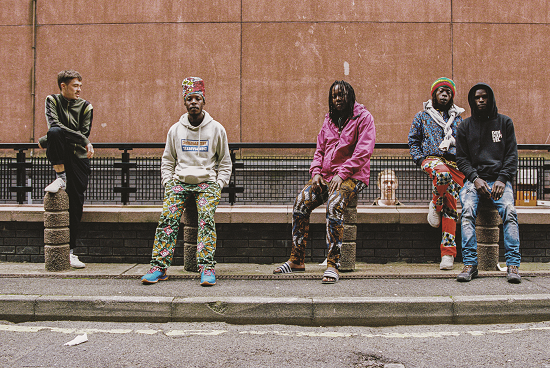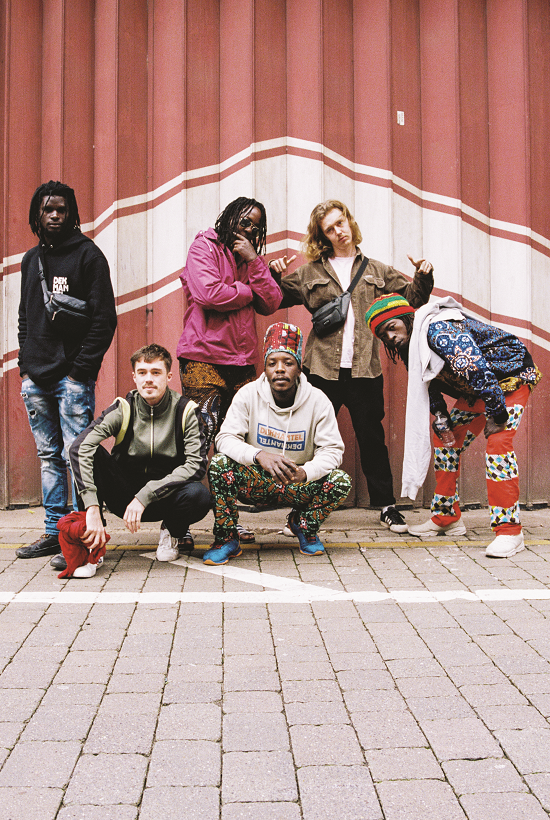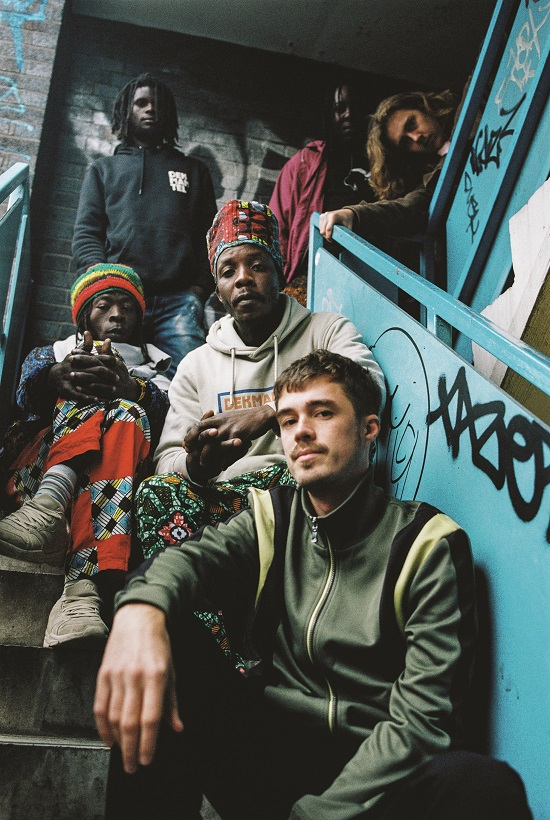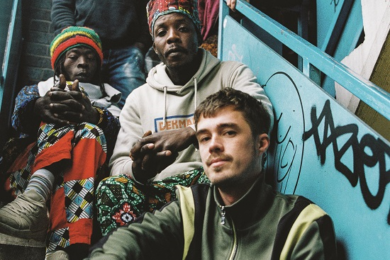All photos by Will Leeming
It’s hard not to feel a little sorry for Nihiloxica. An overwhelmingly potent live force, the band’s mix of thundering drums from Ugandan percussion collective Nilotika Cultural Ensemble and searing electronics from British musicians pq and Spooky-J was sharpened to a razor’s edge. After years spent honing their practise in residence at crucial label Nyege Nyege’s Boutiq Studio in Kampala, performances across Europe’s clubs and festivals had seen them build up significant momentum that has since screeched to a halt following the coronavirus outbreak. Of the back of their debut album Kaloli, released in April, they had a series of tour dates booked, all of which have been postponed, with even their rescheduled shows in doubt.
As Spooky-J tells us over the phone from Amsterdam: “Everything was flowing really well, we were getting loads of shows, and now it’s just hit a wall.” Nihiloxica are first and foremost a group to be experienced live, he says. Nevertheless, it’s easy to overlook just how potent they are on record too. Kaloli, their debut for Crammed Discs, is an extraordinary record, a rumbling and intense listen, punctuated by sinister crackles and fizzes of experimental electronics. The follow-up to two pummeling EPs – their thundering 2018 self-titled debut and its harsher follow-up Biiri (2019) – it demonstrates that while their live momentum may have slowed, their creative vision remains undimmed.
They’re also part of the programming for Gateshead’s TUSK Festival’s virtual 2020 edition, which organisers are billing as “the most raucous rollercoaster of an avant garde TV station you could ever imagine,” and will see them join a hugely exciting live-streaming line-up that includes Eiko Ishibashi & Jim O’Rourke, Matana Roberts, Guttersnipe, Angel Bat Dawid and more. To find out more, you can click here. To read our interview with Spooky-J, telling the story of the extraordinary Nihiloxica thus far, read on!
tQ: As I understand it, the seeds for what would become Nihiloxica were sewn when you went over to Uganda for a show and a brief residency in 2016. Can you tell us more about it?
Spooky-J: I went with my friend Tom from Blip Discs, because Ben got this residency with the label and I’d released my own stuff with them. We played at Nyege Nyege Festival and from there we met all the Nyege crew and the Nilotika Cultural Ensemble. I had a good vibe with them, so I thought I’d organise a separate project.
When did you first start working with the Nilotika Ensemble?
I saw them performing at Nyege, but we also went to their centre where they’re based. They have a tailoring shop there because they also do tailoring as one of their professions. We had a recording session, but also just a jam. The initial ideas I had going into it were very different to the eventual outcome. For some reason we tried to multi-track a drum ensemble, which is a really stupid idea, but we did get all these isolated parts that could be used just for producing. But I was feeling funny about sampling music and not having a proper dialogue with the musicians I was sampling. If I sampled as well as working together with them, and everyone was in the loop, I’d feel more comfortable with it, but I felt disconnected and a bit uncomfortable. Now we have more communication it makes much more sense, but that’s why we initially wanted to start as a live project.
I think it’s more interesting to hear a back and forth than just an English producer sampling them.
It’s less like ‘us and them,’ we’re just a band. Obviously, we’re from different cultures and countries, but at the end of the day we’re just a band that play together and write music as a group.
How did pq become involved?
When I initially got funding I was going to work with this producer Airhead, but he backed out at the last minute. So I asked my mate Pete to join instead, which was a way better decision for the longevity of the project. Me and Pete never played in a band together, even though we lived in the same house for a while, but we were always making music and jamming together. So when this opportunity came up I thought ‘who’s someone I enjoy working with?’ I wanted it to be a live project with synths and electronics and he was my go to person. And also we were both not really doing much and I didn’t really want to be in Leeds. I was like ‘look, do you wanna do this thing?’ He said ‘yeah, sure’.

Was that all the sell was?
Actually we were at this night in Leeds called Cosmic Slop, and we were really drunk and we were literally on the dance floor and I was like ‘Pete, could you come with me to Uganda?’ The next morning he was like ‘wait, did you mean that?’ I booked tickets the end of that week
Tell me more about the early recording sessions for the first EP, what was the atmosphere like?
The first sessions were a bit nerve-wracking. I’d come up with some initial sketches for songs and that’s what we were basing it off. When we were in Leeds Pete and I re-synthesised some of the parts on synth, so we had already these patches ready to go. Pete’s set up is really only a Minilogue and a Monologue, these two budget synths from Korg, which quite nice because that’s very much the sound of the band now, stretching what we can do with that palette. But then there was the pressure of writing this whole EP and then having a showcase at Nyege Nyege Festival at the end of it
What was that gig like?
It Sunday night and it was pouring with rain and there were maybe ten people there. So it wasn’t the best. Also one of the guys didn’t show up. Prince. He’s actually still in the band. And so much stuff went wrong. But it was good, it was a good test to see what it was like, and what to change, I really changed the setup after that. We reduced the number of musicians to six rather than nine. On the first EP me and Pete had brought ideas to the table apart from Kadodi which is a tradiiontal rhythm, but the second EP was very much written as a band. A dialogue more than a one way conversation.
Describe the set up at Nyege’s Boutiq Studios
We were living in their villa so we were constantly surrounded by artists and musicians and stuff. It’s a pretty ideal set up. There was a rotating cast of people coming to do residencies from all over the world. With this kind of music and scene it can be very European centred, or North American centred, but there were collaborations from all over Africa, from South America, Asia, it really felt international. And you were living with all these people, so you’re not only seeing what they’re doing creatively but having dinner together and getting to know each other and going out together. It was a beautiful little commune
When it came to Nihiloxica, what was the daily routine?
It was twice a week we’d rehearse. It’s good not to over-rehearse, especially if we’re preparing a set, but we made it feel really tight and natural, no awkward intervals in this really high energy music.
I saw an interesting quote from you when you played the White Hotel, you said “The intention is to play these kinds of places, not like a world music festival. Our music is supposed to be for a club.” I’m put in mind of that when you talk about looking for a continuous flow from your music…
If it was to be one continuous set because that’d just be too much for us, we’d probably die. But it’s environments like a club where we feel more at home because that’s where we’re coming from with the music we write. There’s been shows that are really empty and we think ‘what the fuck are we doing here’? We really respond to the energy of the crowd. The reason [the Nilotika Cultural Ensemble] were working with Nyege was that they had been playing drums on top of DJ sets, so they already had an introduction to that scene too. Everyone in the band was not strictly into traditional music, they were all into reggae, pop and hip hop. They all play traditional drums but that’s not what they listen to, they’re not devout traditionalists in that sense.
Your first gig in the UK was supporting Aphex Twin, what was that like?
I mean at the time it was like what the fuck, and it was our first show in the UK, but the gig itself was a bit shit! It was stressful, we had a really bad soundcheck and we played really badly. People always ask us about it because it’s Aphex Twin, and I’m always like ‘yeah, wasn’t that fun’. The next day we drove to Bradford to record the album…

At this point you’d moved from Nyege Nyege to Crammed Discs. How had things developed?
We allowed ourselves to explore a lot more stuff. Nyege weren’t into some of the stuff we were writing, so we felt that with this alum Crammed could give us a lot more freedom. We wrote some songs that weren’t as dark, some that were even darker, some interludes… I think It represents everything we’ve been doing for the last couple of years. Some of the songs we wrote in our first sessions for the first EP, so it’s kind of a nice snapshot of the last two years, basically. I think with the next album, whenever we do that, will definitely be even more of a progression.
The coronavirus pandemic must have hit Nihiloxica particularly hard logistically.
We’re a live band, so to release an album and not follow it up with a tour was really tough. We see live performances as our way of expressing our music. We had so much momentum, everything was flowing really well, we were getting loads of shows, and now it’s just hit a wall. We have another tour booked for February but we don’t know what’s going to happen. But I’ve been OK here in Amsterdam, I’ve found some work, but my bandmates in Uganda have been hit a bit harder. Everyone’s trying to find a way through it all and support each other where we can.
Pandemic permitting, where do you see the future of the group?
I think we want to try some new ideas in the form of introducing some vocals, we already have songs that have some vocals but we haven’t really finished them yet. We have to do it in a way that isn’t just slamming a vocal on it and trying to make it work. And also just integrating other sounds, maybe buying a synth!
Nihiloxica are a part of TUSK Festival’s virtual 2020 edition, which takes place from September 28 to October 11. To find out more, click here.



